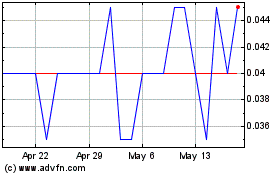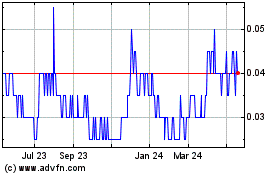Klondike Silver Corp. Commences Drilling on Highly Prospective Segment of the 'Main Lode' Structure on Silver Ridge
May 28 2009 - 11:20AM
Marketwired
Klondike Silver Corp. (TSX VENTURE: KS) (the 'Company') is pleased
to announce that diamond drilling has started from their new
underground west extension of the main access '4625 Level' of the
Silvana mine. This is the first stage of exploration on a 7,000
foot (1.5 km) long presumed highly prospective segment of the
productive and historic 'Main Lode' structure which is the
principal source of the Slocan mining camp's silver/lead/zinc
production.
The Main Lode is over 5 miles (8 km) long, extending from
Silverton on Slocan Lake in the west to Sandon in the east through
the 'Silver Ridge' of the Selkirk mountains some 30 miles (50 km)
north of Nelson, BC.
The Silvana production (see below) arose from a length of just
less than one mile (1.5 km) of the Main Lode under Silver Ridge,
westerly from the Silversmith mine, a former major producer near
Sandon. The Company holds approximately 1.5 km of the ground to the
west of this productive zone, to within a quarter of a mile (0.5
km.) of the Mammoth mine. By way of drifting and current drilling
the Company is testing the first 0.2 km of the 1.5 km gap in
exploration of the Main Lode at an elevation of 4,600 to 5,000 feet
(1,400 to 1,500 meters). This programme represents the first
attempt since the early 1990's to step out westerly towards the
Mammoth and the other major Main Lode producers towards
Silverton.
Mineralized surface outcroppings discovered in the 1890's led to
the start of production from this structure in its distal segments.
The westerly segment hosted (from W to E) the Standard mine which
is the largest producer of Ag and Pb in the camp, and the Hecla,
Monarch and Mammoth deposits, over a distance of some 2 miles (3.2
km). The easternmost segment of over a mile (2 km) hosted (from W
to E) the Hope, Silversmith, Slocan Star and Richmond-Eureka
deposits.
About 1.5 million tons of ore were locally processed or
direct-shipped from these operations. Aggregate recovered
production to 1964 from the west segment was 9.5 million ounces of
silver, 45,000 tons of lead and 60,000 tons of zinc. The easterly
segment yielded approximately 9 million ounces of silver, 43,000
tons of lead and 13,000 tons of zinc. (The disparity between zinc
tons recovered from east and west Main Lode mine groups is from the
earlier-developed eastern group having recovered a much smaller
percentage of zinc in processing or by avoiding 'zincy' material
when the metal was less sought after or difficult to recover using
the technology available at the time.)
Almost all of this production arose from a zone within the Main
Lode lying between roughly 4,000 feet (1,200 meters) and 5,500 feet
(1,700 meters) elevation. The central unexplored portion of this
prospective deep zone passes for 2.5 miles (4 km) beneath the 5,000
(1,500 meters) to nearly 8,000 feet (2,400 meters) approximate
elevations of steep-sided Silver Ridge. It received initial
underground exploration westerly from the Silversmith mine area by
the Kelowna Exploration Company in the late 1940's using a
programme of lateral drift mining and diamond-drilling.
A similar but extensive programme was started in late 1962
westwards from the Kelowna work by the "Silmonac Syndicate". Their
persistence was rewarded in 1967 with the discovery from
underground via diamond drilling of a Ag/Pb/Zn mineralized section
of the Main Lode (not recognized definitively as such at the time).
That section was explored, developed and mined from by Silmonac's
successors including Kam-Kotia Mines Limited, Silvana Mines Inc.,
Dickenson Mines Limited and Treminco Resources Ltd. almost
continuously from 1970 to 1993, and now by Klondike Silver.
Production to date is about 8 million ounces of Ag and over
30,000 tons each of Pb and Zn from some 550,000 tons of mill feed,
representing 30% of the area silver and 25% of its lead production.
This makes the Silmonac/Silvana operation easily the second largest
single producer of silver and lead in the Slocan camp after the
Standard Mine. Noteworthy is that the silver-ounces-to-lead-percent
ratio from the Silvana production has been higher than that from
the Standard mine production, an enhancement that improves the
economics of Silvana's typical mill feed.
For a map of the 2009 target drilling are click on the following
link:
http://www.klondikesilver.com/i/pdf/2009-05-28_NRM.pdf
The technical information in this news release has been prepared
in accordance with Canadian regulatory requirements set out in
National Instrument 43-101. Mr. Edward Craft (P.Eng.) is designated
as the qualified person who reviewed and approved the contents of
the press release.
About Klondike Silver
Klondike Silver Corp. has assembled a quality portfolio of
silver and silver-rich poly-metallic properties in historic mineral
districts in North America, and is applying advanced exploration
technologies to add value to these core assets. Klondike Silver is
reviving the Gowganda and Elk Lake silver camps in Ontario, and the
world-famous Klondike district of Yukon Territory. The Company owns
a 100 TPD fully operational flotation mill in Sandon, BC, which is
currently processing material from one of its Yukon properties and
local mines in the historic Slocan Silver Camp.
The statements made in this Press Release may contain
forward-looking statements that may involve a number of risks and
uncertainties. Actual events or results could differ materially
from the Company's expectations and projections.
The TSX Venture Exchange does not accept responsibility for the
adequacy or accuracy of this news release.
Contacts: Corporate Inquiries: Kevin Hull (604) 685-2222 Email:
info@klondikesilver.com Or visit Klondike Silver's web-site:
www.klondikesilver.com to see Smartstox interviews with Company
President, Richard Hughes. AGORACOM Investor Relations Email:
KS@agoracom.com Website: www.agoracom.com/ir/KlondikeSilver
Klondike Silver (TSXV:KS)
Historical Stock Chart
From Jun 2024 to Jul 2024

Klondike Silver (TSXV:KS)
Historical Stock Chart
From Jul 2023 to Jul 2024
